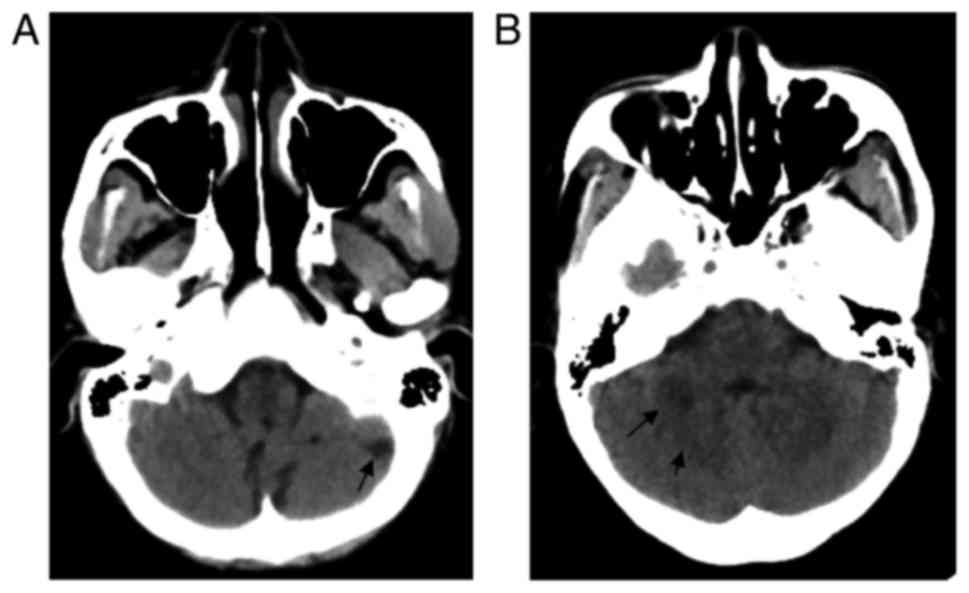|
1
|
Strong K, Mathers C and Bonita R:
Preventing stroke: Saving lives around the world. Lancet Neurol.
6:182–187. 2007. View Article : Google Scholar : PubMed/NCBI
|
|
2
|
Warlow C, Sudlow C, Dennis M, Wardlaw J
and Sandercock P: Stroke. Lancet. 362:1211–24. 2003. View Article : Google Scholar : PubMed/NCBI
|
|
3
|
Abraham J, Rao PS, Inbaraj SG, Shetty G
and Jose CJ: An epidemiological study of hemiplegia due to stroke
in South India. Stroke. 1:477–481. 1970. View Article : Google Scholar : PubMed/NCBI
|
|
4
|
Clouse LH and Comp PC: The regulation of
hemostasis: The protein C system. N Engl J Med. 314:1298–1304.
1986. View Article : Google Scholar : PubMed/NCBI
|
|
5
|
Kisiel W, Canfield WM, Ericsson LH and
Davie EW: Anticoagulant properties of bovine plasma protein C
following activation by thrombin. Biochemistry. 16:5824–5831. 1977.
View Article : Google Scholar : PubMed/NCBI
|
|
6
|
Sydes MR, Stephens RJ, Moore AR, Aird EG,
Bidmead AM, Fallowfield LJ, Graham J, Griffiths S, Mayles WP,
McGuire A, et al: Implementing the UK Medical Research Council
(MRC) RT01 trial (ISRCTN 47772397): Methods and practicalities of a
randomised controlled trial of conformal radiotherapy in men with
localised prostate cancer. Radiother Oncol. 72:199–211. 2004.
View Article : Google Scholar : PubMed/NCBI
|
|
7
|
Adams H Jr and Biller J: Classification of
subtypes of ischemic stroke: History of the trial of org 10172 in
acute stroke treatment classification. Stroke. 46:e114–e117. 2015.
View Article : Google Scholar : PubMed/NCBI
|
|
8
|
Reitsma PH, Bernardi F, Doig RG, Gandrille
S, Greengard JS, Ireland H, Krawczak M, Lind B, Long GL, Poort SR,
et al: Protein C deficiency: A database of mutations, 1995 update.
On behalf of the subcommittee on plasma coagulation inhibitors of
the scientific and standardization committee of the ISTH. Thromb
Haemost. 73:876–889. 1995. View Article : Google Scholar : PubMed/NCBI
|
|
9
|
Deguchi K, Tsukada T, Iwasaki E, Wada H,
Murashima S, Miyazaki M and Shirakawa S: Late-onset homozygous
protein C deficiency manifesting cerebral infarction as the first
symptom at age 27. Intern Med. 31:922–925. 1992. View Article : Google Scholar : PubMed/NCBI
|
|
10
|
Kato H, Shirahama M, Ohmori K and Sunaga
T: Cerebral infarction in a young adult associated with protein C
deficiency. A case report. Angiology. 46:169–173. 1995. View Article : Google Scholar : PubMed/NCBI
|
|
11
|
Kazui S, Kuriyama Y, Sakata T, Hiroki M,
Miyashita K and Sawada T: Accelerated brain infarction in
hypertension complicated by hereditary heterozygous protein C
deficiency. Stroke. 24:2097–2103. 1993. View Article : Google Scholar : PubMed/NCBI
|
|
12
|
Martinez HR, Rangel-Guerra RA and Marfil
LJ: Ischemic stroke due to deficiency of coagulation inhibitors.
Report of 10 young adults. Stroke. 24:19–25. 1993. View Article : Google Scholar : PubMed/NCBI
|
|
13
|
Matsushita K, Kuriyama Y, Sawada T and
Uchida K: Cerebral infarction associated with protein C deficiency.
Stroke. 23:108–111. 1992. View Article : Google Scholar : PubMed/NCBI
|
|
14
|
Okon MA and Spooner SF: Protein C
deficiency and stroke in pregnancy. J Obstet Gynaecol. 18:182–183.
1998. View Article : Google Scholar : PubMed/NCBI
|
|
15
|
Sultan A and Malik IH: Recurrent cerebral
infarctions in a young patient: Combined protein C and S
deficiencies. J Coll Physicians Surg Pak. 23:813–814.
2013.PubMed/NCBI
|
|
16
|
Tiong IY, Alkotob ML and Ghaffari S:
Protein C deficiency manifesting as an acute myocardial infarction
and ischaemic stroke. Heart. 89:E72003. View Article : Google Scholar : PubMed/NCBI
|
|
17
|
Yang FC, Hsu CH, Lin JC, Chen CY and Lee
JT: Inherited protein C deficiency with acute ischemic stroke in a
young adult: A case report. Blood Coagul Fibrinolysis. 19:601–604.
2008. View Article : Google Scholar : PubMed/NCBI
|


















